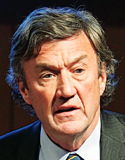
John H. Noseworthy, MD
In his Shattuck Lecture, the 129th delivered since the tradition began in 1890, former Mayo Clinic CEO Dr. Noseworthy gave a powerful shout-out to the role of compassion in medicine. “The Mayo Clinic depends as heavily on our culture of caring and discretionary
efforts of our staff as it does on research and technology,” he asserted, then repeated the statement for emphasis. He explained that the organization, which he ran for a decade, has worked hard to create that culture, and that it depends
on two primary things to thrive:
- The ability to spend extra time with patients when needed
- A designated physician to coordinate care when patients’ problems are complex and multiple physicians are involved
“[Our profession] has given up on advocating for unhurried time with patients and we need to rethink this,” he said. “There’s a sound clinical and business case for spending more time with certain patients… It’s also a great satisfier for us as physicians.”
Mayo is very intentional about protecting physicians’ clinical time — doctors are salaried, as one example — but even they are struggling with an ever-growing regulatory and clerical burden, he noted.
Dr. Noseworthy went on to talk about collaboration and teamwork, which have been norms at the Mayo Clinic since its founding. A physician coordinator is assigned to patients with complex cases, bringing “the voice of the patient to specialists and then
the coordinator comes back to the patient with recommendations from the specialists,” he said. The coordinator helps the patient think through any disagreements among the specialists and determine next steps. Staff are recruited not only for
their excellence as physicians, educators, and investigators, but also for their “ability to work collegially with others in service to the patient,” he explained. Working as a team also ensures that no physician needs to know everything or
feel alone when managing complexity.
“The most fundamental element in our profession is still the relationship between the patient and the physician. It’s at the heart of our care and has been a constant across cultures and across centuries,” he said to hearty applause.
